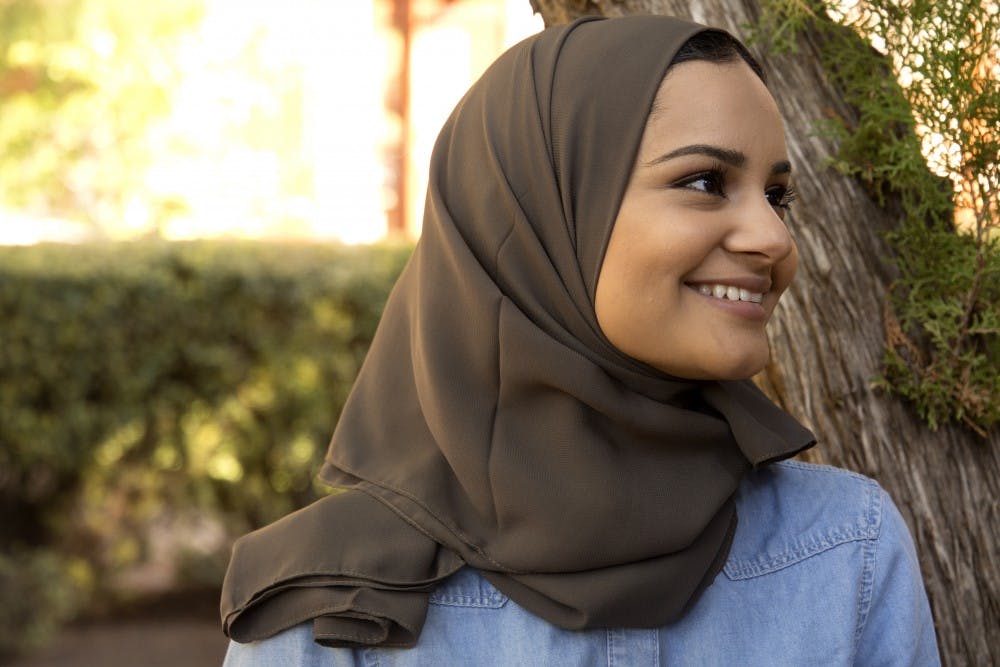My mother rarely buys things for herself, so when I see an opportunity for her to buy something nice for herself, I make sure she does. We were at a nice boutique, deciding between wedges or heels when the man assisting us just couldn’t resist asking us a question. He pointed to her headscarf, did an odd wrapping motion with his fingers, and said in an accusatory way, “Why do you wear that … um, that thing on your head?”
My mother saw this as a teaching moment, and decided to tell him its historical, religious and social context, and most importantly, its meaning to her in an impressive five-minute explanation. The expression in the man’s eyes became dull and bored; he cut her off with a very canned response of gratitude and proceeded to check us out.
I then realized something I should have when I first started wearing a headscarf. This man did not care about the response because it did not fit his already preconceived notions about it; she did not give a tale of being forced to, hint at the word oppression, nor did she regard it with rejection. My mother proudly wore it and perfectly articulated her reasoning, and to him, this was simply not entertaining.
Before I elaborate, let me make something clear; hijab does not mean headscarf, the two are not synonymous. Women and men participate in hijab, which is a personal interpretation of modesty. With that in mind, every person who wears a headscarf does not maintain the exact same moral values, political values, social values and so on. We’re people; we are individuals.
When you approach me at Subway while I’m getting a sandwich and ask “why do you have to wear that thing?” don’t expect me to drop everything and answer you, because most likely I will ask you, why you have to wear cargo shorts with a Hawaiian t-shirt. Yes, the two are analogous, because sometimes when I wear a headscarf, it’s just that. I’m not trying to make a political statement, a social or religious statement. Most of the time, I’m just wearing it and trying to go about my day. It impedes on my privacy, my safety and my individuality to ask me questions you don’t deserve the answer to.
Here’s the social difference between me asking why you’re wearing cargo shorts and you asking why I’m wearing a headscarf: Due to stigma about Muslims, the minute you ask that question I feel the entire room stare at me. I feel alienated, unwelcome and scared. At any moment, there is opportunity for resistance to my answer or even being attacked. Not to mention, there are days when my headscarf is my biggest insecurity because of how much it is dissected. To be asked about, at times, my biggest insecurity is a feeling indescribable by words. It makes me stronger, but I'm afraid the people asking me get weaker when I enable their behavior.
The truth is I’m not Google, I’m not a walking Quran and I’m definitely not God. I do not have the answers; I never will. When I’m asked about dating, praying, my personal sense of modesty and the abstract concepts of heaven and hell and who goes there, here is my truth: I don’t know. My beliefs are ever-evolving, my spirituality is highly private and my relationship with a higher power is my own. My religion, spirituality and individuality are not up for dissection.
What is especially baffling is when I think about a scenario in which someone approaches a stranger who is not donning a headscarf, asking the stranger personal, spiritual questions. It simply doesn’t happen, and the only difference is a piece of cloth. If the goal of one’s question is to insinuate that I am oppressed because of my appearance, then maybe we are not as intellectually developed of a species as I once thought we were.
I welcome personal questions the same way anyone else accepts them, in a safe environment between people I trust. If there is a burning question that must be asked, be mindful of the deliverance and realize I just may not be in the mood. Yes, there are countless stories I’ve heard regarding a stranger meeting a Muslim in a headscarf for the first time, and having a life-changing experience because they can finally view us as people. I’m not here to humanize others and myself, I’m just here to live my life and hopefully get a degree.
My best friend Danya and I were shopping for sunglasses, trying them on and making funny faces, when an employee looked at us with pity in her eyes and asked why we wear “that” on our head; we dutifully responded. Her eyes became dull and she seemed bored with our carefully thought out explanation. We suddenly felt the need to leave, Danya and I walked in silence together for a little while after until she turned to me and said, “I’m just tired.”
Related Links:
Pakistani women discuss gender in “Beyond the Hijab”
Saudi Arabia implements new laws for women
Reach the columnist at anshakoo@asu.edu or follow @ashak21 on Twitter.
Like The State Press on Facebook and follow @statepress on Twitter.
Editor’s note: The opinions presented in this column are the author’s and do not imply any endorsement from The State Press or its editors.
Want to join the conversation? Send an email to opiniondesk.statepress@gmail.com. Keep letters under 300 words and be sure to include your university affiliation. Anonymity will not be granted.




